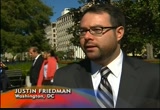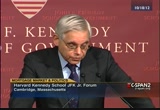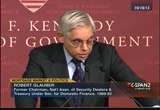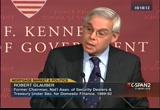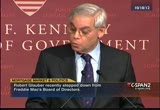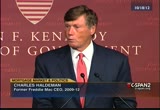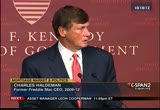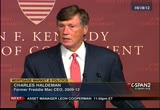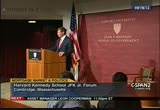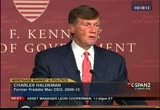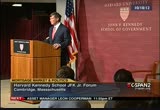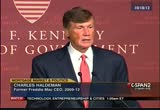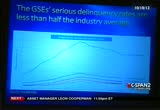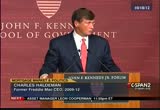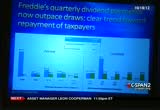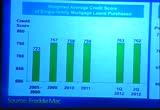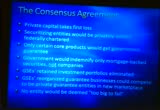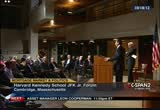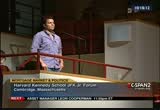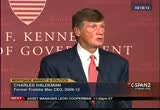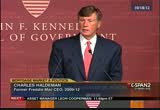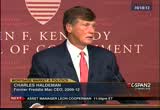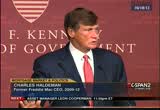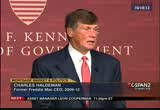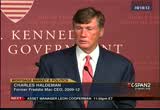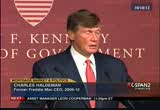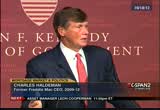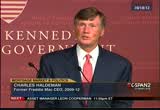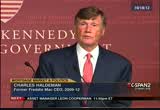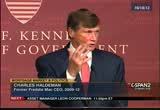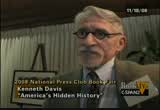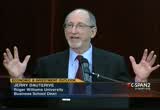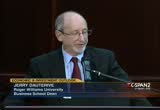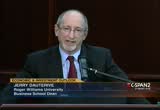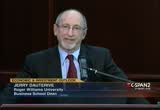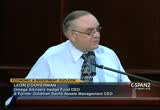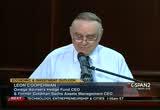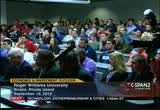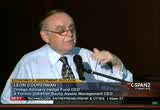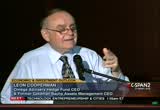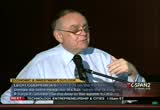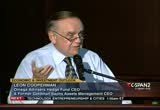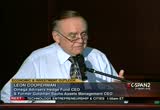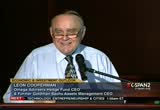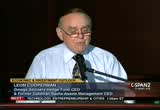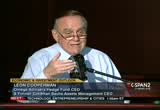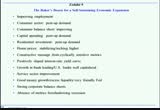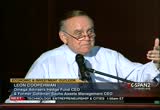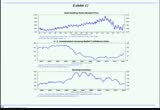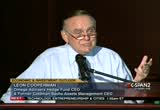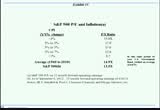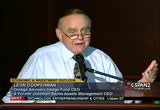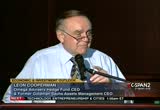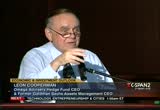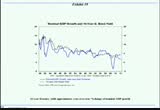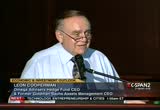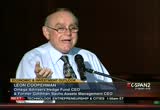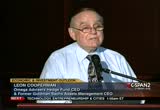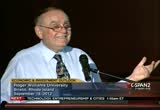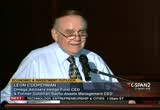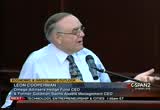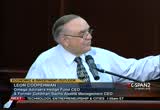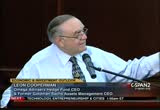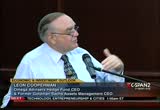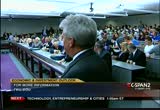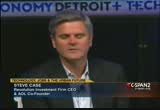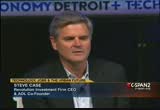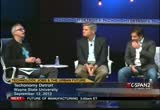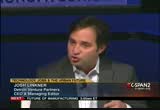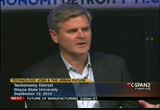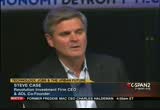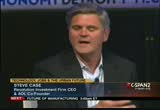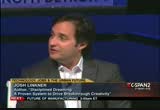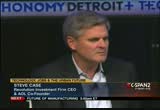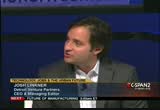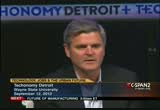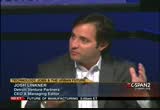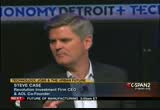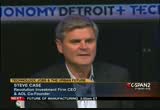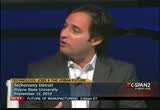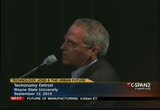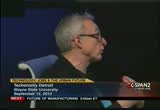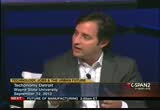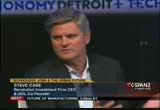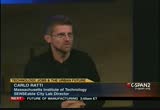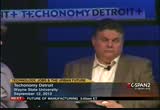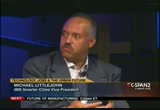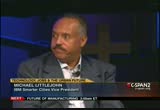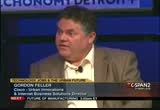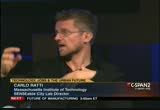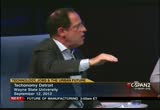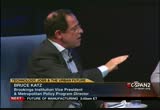tv Capital News Today CSPAN October 30, 2012 11:00pm-2:00am EDT
11:00 pm
there is simply too much analysis. there certainly isn't opinion and i appreciate how i can really see through and understand the programming at golf and i can get my analysis elsewhere. if you want to see how your government works directly, c-span is the only place to go. >> until a few months ago, charles haldeman of freddie mac. he began the job in 2096 months after the company was taken over by the federal government. mr. haldeman spoke about the housing market and financial regulations at the john f. kennedy school of government. this is just under an hour.
11:01 pm
>> i'm a member of the faculty here at the kennedy school at a romani school of business and government. it's a pleasure to welcome all of you to this year's lecture, which is funded by nasd, which is now in the, the private broker of the u.s. industry. the focus is on financial regulation and each year we have had a leading public official responsible in some ways for u.s. regulation. this year, our speaker is a tiny bit of a stretch, but not really much at all. ed haldeman was ceo of freddie mac from a 2009 to just a few months ago. while in that role, ed was not really a formal regulator. he was responsible for running a very large public financial
11:02 pm
institution. freddie mac and its sibling, fannie mae are what are called government-sponsored entities, gics. for years described as private companies at the public mission of supporting housing or more simply, as mixed public-private enterprises. but in september 2008, both institutions failed financially. they were placed in government conservatorship, becoming quite unmixed just public corporations. the gics have had many problems of their conservatorship. ad was not part of that arriving by the year after conservatorship. but add was part of the solution. the risk of running freddie mac is a big challenge. it's very large business. about 5000 people. but the balance sheet at its peak, before conservatorship of just under a trillion dollars.
11:03 pm
that included about $800 billion of mortgages financed directly by friday and another $1.7 trillion of mortgages guaranteed off balance sheet. together with fannie mae, freddie mac's responsible for roughly half the u.s. mortgages made to homeowners. since conservatorship, the amount of mortgages directly on the balance sheet of fannie and freddie have declined, but their role in finance u.s. homeownership has in fact shot a. today, roughly three quarters of u.s. mortgages are made for her and she by freddie and fannie. i had a bit of a roll after his place in conservatorship yet i
11:04 pm
was in the freddie mac ford, head of governing and nominating committee. the first ceo of freddie was put in place by the treasury department at the time of conservatorship quit after six months. we had to make a pitch to add to take the job. it was fairly simple, and most challenging job, which is a germanic understatement. but the opportunity to do meaningful public service. setting for any needed strong leadership and steady guidance as they rehabilitated themselves and waited for the government to decide just what to do with them. i should point out that we are still waiting for the government to decide just what to do with them. it's now four years since the readership. and beyond some partisan back-and-forth about things handling of foreclosures, housing policy has been one of the elephants in the room during the campaign.
11:05 pm
ad has had an outstanding career in both public-private sector, leading important financial institutions after degrees from dartmouth, hbs and harvard law school and started his career with the philadelphia investment accounting film dealer. it was later bought i united asset management which churn for eventually ran he became the u. of delaware messman and next he was called to run putnam investments here in boston and even larger management firm that has advanced to the previous management. he righted that it eventually sold a good price for shareholders to a large canadian financial firm. it was at that time that we approached add to run. freddie and fannie, together with a broader issue of u.s. government involvement in
11:06 pm
housing finance is one of the major unfinished pieces of business and financial regulatory reform. it's clearly an important issue. we c-span here filming this. ed has the unique perspective. an experienced manager of the frontline running the gics and most thoughtful public policy participant. he's done when the talk about where the gics have been and what to do with them. my great pleasure to introduce ed haldeman. [applause] >> inc. so much for the kind introduction. i'm very appreciative of so many of you coming out tonight to visit with me and learn about freddie mac and the gics. i'm particularly pleased to be giving the glauber lecture here
11:07 pm
tonight. there are many, many people, perhaps hundreds, maybe even number in the thousands of people whose career was launched by bob glauber. i am one of those feared doctrine one-time investment management in 1973 at harvard business school and as he indicated, i spent approximately 35 years in the money management industry. so i don't distinguish myself based on my career been launched by bob glauber, but what i think it's a little bit special about me, perhaps unique is that my career began and ended with bob glauber. [laughter] is particularly this week, i think i have to be careful about the preposition i used in that last clause because rob was on the board. i was the ceo and the preposition i used was my career
11:08 pm
ended with bob, not by bob and i think it's a particularly insensitive to making sure everybody knows we ended our time at freddie mac together. i'm also pleased that the subject of the lecture tonight is freddie mac and the gse so i have an opportunity, now that i'm no longer the ceo, have an opportunity to present a balanced view of the gics. this is a subject, which i have come to see others speak very aggressively, emotionally. it is a subject he gets very heated and it is very uncommon for people to present a balanced view. in fact, my goal tonight is to present a balanced view and if i
11:09 pm
succeed, it may be the first time there's ever been a balanced presentation. certainly, the employees that work with me were passionate about the role, the function they perform, almost a religious kind of mission is what they felt they were doing at freddie mac. and it is hard to imagine that there were other people in societies that had the same kind of visceral feel in the opposite direction about the work that they did. neither side able to the the other point of view. hopefully in the course of the next 15 minutes or so, you will come to balanced opinion about freddie mac and the gics. i want to start with where they've been and go back quite a bit in time back to 1938, when the first gse was created,
11:10 pm
fannie mae, to think about what the mortgage market was late at that point in time because they think they're doing so, we'll see some of the advantages and good things that have been accomplished by cne, freddie and the gses. before fannie, the mortgage market was very different than it is today. the only thing available was short-term mortgages, five or 10 years, variable kinds of rates. the down payment on a 50% was the standard in those days. there is a payment at the end of the term. you had to, but the whole thing at the end of the short-term. very large variations with mortgage money and rate, no standardization, all done very locally with very different standards in the mortgage market was not at all connect it in as a result, rates were quite high in those days.
11:11 pm
subsequently, the mortgage market has changed radically and in large part because of ready, cne and the gses. most importantly, the mortgage market got hayley connected to the capital market, the secondary function performed by the gses connected the mortgage market to large pools of assets to the capital markets, including not just the u.s., but worldwide. there is standardization required by the gses, virtually an illumination of the variability in rates and liquidity by region. there was a broadening out in the access of mortgage money in our country before a very limited high income people very limited in terms of ethnic back down. the gses brought not a substantially and made sure there was white bread availability, fixed-rate, 30
11:12 pm
year mortgages. think about what is so special about mortgages and our country. today, for 3.5% interest rate, you can get dirtier money with no prepayment penalty, a pretty unusual economic opportunity. so those are the early years. the advantages the gses brought to the mortgage market. let's not think about the years just before the financial crisis and think about where the gses has been in that period of time. the reason is worthwhile taking a look at for the financial crisis is that there are many people who have argued in written at the gses cause the financial crisis or cause the great recession. as bob glauber indicated, i was
11:13 pm
not at freddie mac until way after the financial crisis, so i don't really have a stake in this game. but this is a chart i would look at too sore to determine extent i thought freddie mac, cne may cause the price is. i'm not saying that perhaps will find later some contribution, but do you think they cost it? this chart looks at market shares in the market share of the gses is at the top and it's up blue line. and then the british line that starts at the bottom and gets very high is the private market, so this is the investment banks in the commercial banks issuing secondary mds private-label securities we call them. look at the radical market share
11:14 pm
change. freddie and fannie going on the order of 75 or send down to 40%, falling like a rock. and the private-label taking tremendous share. but would be the cause of that? because in my view is a change in underwriting standards, a change from requiring substantial documentation and high underwriting standards, large down payment, many of the private capital competitors reduce some of the standards and were able to take substantial market share. now imagine you are the ceo of freddie mac at the bottom market share number, 40%. the senior market share go from 75% to 40%. he reacts not?
11:15 pm
do you change your underwriting standards? how much can you tolerate in terms of market share loss? is the ceo of freddie mac at 5000 or 6000 employees. it looks like the entire market is going away from me. do i change not? i think the ceos, people running the company did make some changes and we each can make our judgment about what we would have done in that position, but at least argue it's a hard call. it would not be easy to be unchanged in terms of requirements on underwriting standards and have the market share go completely away like that. this is another indication of what i believe whether or not freddie was the cause of the financial crisis. and here we take a look at mortgage default rates over time
11:16 pm
the definition of default is 90 days to link went. you can see that i freddie and fannie at the wordstar delinquency rates cut up into the four to 5% down. for the overall market in our country, it got to be 10%. the subprime sector of the market he got into the 25%. so again, while i believe freddie and feeney did lower their standards, resulting delinquency rate, you can see a big difference between the way freddie and fannie behaved in the way the rest of the industry did. so where i come out en masse is
11:17 pm
that i don't believe that the two gses for the cause of the financial crisis. i do think they did produce underwriting standards, but i think i can understand why the ceo might have done not given what the competition was doing. i do think there were some mistakes and problems made that were connected to the gses and certainly one that i found troubling was summarized in about by gretchen morgenstern called reckless endangerment, which is the story of crony capitalism exhibited by the two gses. i view that look almost as a playbook on how businesses can execute crony capitalism and get close to government for their benefit, not just an incredible lobbying organization, not just
11:18 pm
campaign contributions, but things like hiring repeatedly people coming out of government, opening regional offices and all the critical congressional offices and hiring relatives of congressmen in order to fill those regional offices. so to be sure they offered is accurate. a second problem was the implied government guarantee. this is not some lame but necessarily was generated by the gses, but rather took advantage of it. but what they were able to do because of the implied government currently was fire essentially as much money as they wanted to at the government rate. so unlike most private companies, when you put on more
11:19 pm
and more death as the rate goes up, they were able to borrow almost unlimited amounts of the government rate and then create a retained portfolio, which some people described as a hedge fund because one is able to arbitrage the difference between the government rate and the rate they use to buy in some cases private-label securities. so i don't think the gses for a halt, but i do think it is a stretch to call them the cause of the financial crisis. so let's talk about what the gses have done subsequent to the crisis since they put into conservatorship to point in time that i'm more familiar with. one of the things they have done in one of the reasons i took the job is that they have been the
11:20 pm
only game in town for the mortgage market. and here, the numbers accounting for 75% of the total mortgage market if you add in fha, another government mortgage provider commuted to about 95%. so the private market has been providing only 5% of the mortgage money. where would we have been over the past three or four years without the gses performing this function? in addition, we worked with the administration in treasury department in order to execute some of the government programs. home affordable modification program and home affordable refinance program. you can see the number of modifications done since conservatorship is 1.2 million homes, a big number.
11:21 pm
the only problem is when the idea of modifications was first generated. the program was quickly taken over by political people in and close to the white house and they decided they needed to make an announcement about what hamp was going to do and they said it was going to do three or four modifications. i've no idea how no one got the number, but someone wanted a big number as result, 1.2 has always seemed like it wasn't very successful. it's a pretty big number and the gses executed not just the modification program, but also the refinance program. one of the things we didn't do was we didn't do principal forgiveness and that is -- a not quite ready for this one, but on this list of things up here, we
11:22 pm
didn't do principal forgiveness in some of you have read criticism about us not doing we didn't do principal forgiveness and some of you have read criticism about us not doing. we believe pretty strongly as some of you have read criticism about us not doing. we believe pretty strongly as did our regulator that there was a real risk of strategic default where we offer a program of principal forgiveness, which is to say that even though freddy has lots of underwater mortgages , over 80% are still current. nobody had any problem or has continued to make their obligation despite being underwater. we worried about principal forgiveness having some impact on those a cent of the underwater mortgages and we thought it's better to focus our attention on hamp rather than add principal forgiveness. i wanted to spend just a minute on another part of our
11:23 pm
subsequent conservatorship, which would be profitability. many of you have read about standing back and freddie may. in front of you is two bars. one is the amount to draw with taken from the federal government and the green bar is a moment dividends paid. what a lot of people don't recognize is that the dividends that we have to pay now i remember like $7.2 billion a year. so if you generated $7 million in income, you'd still have to draw something from the government and that's why people continue to talk about draw. if you look at the total record for the entire time, the round numbers rhr from the government of 70 billion dividends at 20 billion, beating a net drop of 50. you can see them to designate
11:24 pm
when that your son come, the draw was 40 billion. so everything subsequent to 2008 has been a drive required to pay dividends. that is a net neutral impact on the treasury. and the reason we been able to get to that level of profitability is that all the mortgages that have been put on in the last years during conservatorship have been very high-quality in terms of down payment and in terms fica score, much higher than was the case prior to conservatorship. this new book, besides subsequent to conservatorship now accounts for 60% of the total primark. so that was all passed. we talked about the real old time. come on 19 we took a look at the pre-crisis. a much that post-conservatorship. let's now look forward and think about what to do with freddie
11:25 pm
mac going forward. it has been a great frustration to me that the treasury department and the administration has come up with no program policy recommendations as to what to do. it is now 50 months we've been in conservatorship. it's now 50 months to 6000 people who work at freddie mac don't know if the company existed no job security at all. the treasure was to put out a position paper in january 2010 with the subjective solution. they didn't do that. it didn't come until january january 2011 and then the white paper of the stooges three options, three options obvious to anyone on day one of conservatorship. so it's a great frustration remained a progress in this area, particularly when i believe there is strong consensus on what we ought to do.
11:26 pm
before you is a proposal put forward in august of 2009 by the mortgage bankers association, which talks about farming companies, friday capital companies they call it the cheese, market credit guarantee entities, which would be three to five the number of the private capital companies to compete with one another, that there would be no government guarantee of the companies. there'd be a government guarantee of the securities, mortgage back securities. or for that t., they would pay an insurance premium much like fdic insurance. the securitization would only be a plain-vanilla kind of mortgages. anything outside it would have to be done in the private capital market and there would
11:27 pm
be no retained portfolio at all. so we had this proposal, a sensible proposal in my view in august of 09. three years later, a really smart guy named jim milstein who is at the treasury department, the guy was possible for the restructuring of aig is the voyeur in investment in keene restructuring kind of person and he put out a proposal, which has many common ingredients that we saw from the mortgage bankers association. here, the emphasis is on a government agency. the federal mortgage insurance association, which authorizes management regulate a series of securitate there's the issue mortgage-backed securities and again, the company are not guaranteed, just security czar.
11:28 pm
the beauty of both of these proposals is that the technology in the infrastructure and system in the human capital of the gses would not be reset, that could form the basis of one of these securitize theirs to compete in the private capital market going forward. so i believe that there has been some consensus around a proposal that is feasible would work. one was issued by somebody who had an ax to. that is the mortgage association, but milstein coming from the treasury department come up or simply his view is what is best for the economy, but it's a very similar proposal in my estimation and i wish that we could move ahead with them being like this then you would be tremendous benefit icing for the taxpayers to get some usefulness out of this investment that they have made
11:29 pm
11:30 pm
11:31 pm
company the middle of 2009. at that point, everyone was certain that the company would be relaunched at some point. possibly in a couple of years. obviously, we have been disappointed in that. as the calendar rolled through three or four years, i concluded looking at my birth certificate that i probably wasn't going to make it. that was one indication of my pessimism about when we were going to get this resolved. it was clear to all of us that as we got into the election year, that nobody was going to spend any time on it, and it has been remarkable how the candidates have been on the subject, given how much of it we
11:32 pm
have talked about. significant things like tax policy and policies on deficits. i think there is going to be a long period of time before we will get any action on this. i'm just talking about when someone puts out an idea, which has to be challenged in congress and debated, and then you get something fast, and then you have the implementation. after all, think about where we are as far as implementation in terms of obamacare. unfortunately, i am very pessimistic about when we finally get resolution. >> yes, sir. >> i am a student at harvard kennedy school. you started your remarks talking about the incredible remarks
11:33 pm
before the conservatorship. as we think about the entities that will follow, how we think about creating an appropriate amount of political installation against lobbying when it comes to capital requirements or appropriately pricing governments guarantee? >> that is a real important question. i can tell you that during my time in the conservatorship. we had really strong restrictions. we were not able to make any political contributions. not just the corporate level, but i, personally, was not able to do it. i happened to go through law school with a couple of senators. i was not able to visit with them even on a personal sense. it precluded from any interactions.
11:34 pm
we had to go to a regulator. initially, all the lobbying and the lobbying people were let go. i can tell you that it has been totally insulated with a couple of exceptions, which were really annoying to me. which member of congress, who felt like they own freddie mac, like they own me, but they would call on my personal cell phone. i don't know how they got it, trying to make me intercede on some action the company was about to take. presumably a foreclosure can kind of activity that have gone
11:35 pm
through the process. it was asked to intercede. there was an attempt in that direction. all of that makes me a little bit pessimistic about your question. i think when we get to the resolution, one would hope that we would have the private capital company, which would be regulated very closely with restrictions on campaign contributions, lobbying, those kinds of things. but we are also going to have to have strong leadership for those who don't buckle to the pressures that they receive. but it is a problem. i guess against the reason that i'm not too pessimistic is because we have gone through this period of time where we have been incredibly disciplined about employment and political
11:36 pm
activity. >> you also talked about the discipline of the gse during this period. what they have guaranteed. have you come money pressure? >> very modest. obviously, the statements made by members of the treasury department administration suggesting that we were too tight or the other place that we would get a little bit of pressure is how aggressively we took the push backs to financial institutions. the very modest and reasonable, i would say, not particularly troubling. >> okay. >> hello, i am a student here.
11:37 pm
i really like your charts. it looks that we focus on the single-family side of things, and i'm interested to see about what to think about the multi-family aspect. >> thank you for that remember to grab a supporter. this is the second time i have spoken since the vice presidential debate, and as a result, every time i sip some water, i wonder whether it is too much or too little or whether it is appropriate or not. [laughter] >> so multi-family is a really great story. it is about 20% -- excuse me, 10% of our business, but it is a successful business. it is one where we have had -- i showed you where we are no matter what time period we are looking at.
11:38 pm
there was a default rate, such that many people but that can be spun out and that is a -- another way taxpayers could receive money. i'm very proud of the efforts that we have made in analyzing multi-family. i think that it could be a very successful standalone company. going forward. >> hello. i am asking this question on behalf of the jfk junior reform committee. would you say that the companies
11:39 pm
have lost the ability to recapitalize themselves? >> i think in the traditional way of using the word recapitalize themselves, yes. because of the 10% dividend requirement. when most got institutions to have bail out, there was a 5% dividend with an ability to repay that. freddie and fannie, the dividend was 10% with no ability to repay. as a result of that, the ability to recapitalize themselves, to use your phrase, really isn't fair. and the numbers for freddie mac is like $72 billion, meaning that the dividends payments annually at 7.2%.
11:40 pm
it is really hard to generate enough capital to meet that dividend and accumulate on your balance sheet. you have a chance to recapitalization. >> i am the senior at the college here. thank you so much for taking the time. you begin your talk by discussing the important advances in the mortgage market after the introduction of gse is. i wanted to know in your opinion and looking forward, to what extent do you think a more purely private area is able to or would be able to achieve the public polls of the gse? >> okay, let's hypothesize no government involvement. you'll remember that i had
11:41 pm
limited government involvement, none of which are too big to fail, none of them have a government guarantee, but the mortgage-backed securities that they issued would be government guaranteed and there would be an insurance premium paid for that guarantee. that is the extent of the government. let's hypothesize to go to your question that there is no ultimate reinsurance, ultimate backing of the security. the disadvantages to that, i think, would be largely in the cost of mortgages. i believe that the mortgage rates would be materially higher as compared to my suggestion. and the reason is that i think that there are big sources of capital worldwide that will only
11:42 pm
invest in our housing mortgage market. if there is some kind of ultimate government backstop. i think there are big pools of assets in asia, for example, that will only invest if there is an ultimate government backstop. i visited during my tenure with some of the holders of freddie mac security from foreign institutions. and they said they would not buy anymore and we would reduce the holdings, because even under the current state of affairs, they were not exactly comfortable with the ultimate government guarantee. we made it clear how significant was to have that guarantee. big pools of assets in our housing market. for that reason, i am willing to tolerate a limited amount.
11:43 pm
>> without government involvement, it would be a higher price for mortgages. and i bet that is right. but the consequence consequence would be a higher mortgage, of course. what would be the consequences of that. would it be good, bad, or not either? >> the consequences of higher rates? >> just. >> well, i think that they would be significant. i think that already, we are going to narrow down the universe of possible homebuyers. because the down payment is so
11:44 pm
large and if you compound that with a higher interest rate, you will narrow that potential home buyer down to a level which i think is unacceptable in american society. and we definitely went too far towards the goal of making everybody a homeowner. we had that single-minded objective of getting that percentage higher and higher, and i think that we push too hard. but i think that if you compound a 20% down payment with significantly higher mortgage rates, i think we would be marrying the universe of homebuyers into small groups. >> my name is jacob and i'm a sophomore here at the college. i wonder if you could talk about the climate and culture when you assumed leadership in 2009.
11:45 pm
what were the expectations and pressures? >> yes, i am trying to describe a little bit. so there are five or 6000 people that work at this company. many of them, like people employed anywhere in our society had in invested a lot of their money in the company. the 401ks, stock holdings. many people are proud of the company that they worked for, and they bought stock in the company. their holdings went down to zero. i am not saying everyone had 100% of a 401k, but there were big holdings that went to zero. and then the people were criticized by politicians as
11:46 pm
being the cause of the financial crisis. these are people doing great work helping people. many of the employees told me that when they would wear a freddie mac t-shirt or sweatshirt to the supermarket or the home depot, they would be accosted by people. acosta for what they had done. as bob indicated, they were put in the conservatorship. six months after the ceo arrived he left. two months after he left, the person who was a chief financial officer, age 42, took his own life. he didn't do anything -- there was no fraudulent activity, but because of the stress. so the employees had that list
11:47 pm
of thoughts and pressures with no job security or idea whether the company was going to exist. remember that there were senior politicians who repeatedly told the press that freddie mac should be abolished. in the paper that the treasury put out, they said many times that the company should be ground down. that is what the friends of the gse said. imagine the morale of the people because of that i try to spend as much time as i could being visible in talking to them and trying to come up with hope for the future. which was around this notion of us getting ready in some form to
11:48 pm
relaunch the company. the good news is that people hung in there and they continue to work hard. they are continuing to function quite well. >> hello, my name is josh, i am a student here at the kennedy the kennedy school. i want to ask you for your perspective on -- or your perspective on the book faultlines. it talks about the need for cycle group regulation. he observes that we come up with these great ideas. ideas like you articulated very well. they get this number, political pressures are applied to what he calls credit populism. seeing that we need to figure out ways to build regulation that somehow that won't happen. they are immune to those
11:49 pm
11:50 pm
up. and then they reverse themselves. it seems like a new generation needs to go through that for they believe it. i think experience and people -- having people on staff, the regulatory authorities or companies who have gone through a few cycles is one great thing to have there. then i think that trying to insulate regulators from the political process is really an important thing to do. we certainly did not do that right at the gse. you can see there was an attempt made to take the teeth out of the regulator. they got too aggressive. they call people on the hill to intervene. those are two thoughts that i
11:51 pm
have on how you might be able to accomplish that goal be mapped okay, we have to end, so let me take one last question. scott, i am a stock member here the kennedy school. thank you very much for your talk. a question on the campaign. you said that there is a proposal from the treasury in terms of what to do next with the gse is. and presumably, an obama administration would follow something along those lines after dealing with the fiscal cliff and tax reform and all the other issues that are on the agenda. what about romney administration? what sorts of proposal, if any, have been articulated? >> well, let me make it clear that i did not say that there had been a proposal by the administration. they produced a long awaited white paper in january of 2011.
11:52 pm
a government solution, he plans solution, or a hybrid solution. i am not being facetious in saying that. so we haven't had a proposal from either side. the mortgage market has changed because of that and i think that the republicans and the administration, as they came in, would want to go more towards a free-market kind of solution without any gse. i would hope that the suggestion that i made and the mortgage bankers association made would
11:53 pm
be seen as something that both sides could live with, and that it is largely a private capital solution. there is not a freddie or fannie. they're our are capital companies that are competing to have the ability to pay a premium in order to get a government guarantee of their underlying security. i would hope that that would seem is enough of a free-market solution that republicans would be okay with it. and enough of a protection of the housing market that the democrat folks might find it acceptable. >> okay. thank you. >> thank you. [applause] [applause]
11:54 pm
>> even the story the textbooks left out, real people in american history, very important moment in american history that we don't know about. the first pilgrims in america came 50 years before the mayflower. they were french. they made wine. they had the good sense to land in florida in june instead of december in massachusetts. but then they were wiped out by the spanish. we let this story out of the textbooks. the most famous woman in america, she was taken captive by indians in 1695. up in new hampshire. in the middle of the night, she killed her captor and realized that scalp him, she's got them, and then she went back to boston as a heroine. they actually erected a statue to her. a first statue of a woman, an american, chewing a hatchet in one hand and the scalp in the other. >> we will take your calls, e-mails, and tweets in india.
11:55 pm
watch live at noon eastern on both tv on c-span2. you are watching c-span2 with politics and public affairs weekdays featuring live coverage of the u.s. senate. on weeknights, watch key public policy events, and every weekend, the latest nonfiction authors and books on booktv. you can see programs and get our schedules at her websites, and you can join in the conversation on social media sites. >> a former general partner of goldman sachs spoke to students at roger williams university in bristol, rhode island, last month. mr. leon cooperman start his own hedge fund in 1991. his company, omega advisers, it is valued at $5.6 billion. leicester team made news for accusing president obama of
11:56 pm
class warfare against investors. >> good afternoon. good afternoon. glad you are here. my name is jerry dauterive. i would like to welcome you to our distinguished leader presentation. we are very glad to hear you and have you here. c-span is taking. i ask that you turn off your cell phones. i would like to thank you for joining us today. our president and vice president is here of the company. i would also like to indicate
11:57 pm
that charles haldeman was our distinguished leader and speaker. it is great that also mario can join us to honor his friend, leon cooperman. we go back a long ways. our speaker last year is here to help us welcome leon cooperman campus. he and mario are legends. i heard it on cnbc, so i know it can be true.
11:58 pm
mr. cooperman has been in the investment and financial industry for a long time. he is the president of the new york society security analysts. he said earlier today that people talk about him, but he doesn't care for, but he needs to. not only is he a leader in the world of finance, he is also a leader in the world of philanthropy. i was reading an article from "the wall street journal" about him. and it was entitled, giving others a chance of the american dream. he talked in that article about he feels that he lived the american dream and he has devoted a good part of his life to giving others the opportunity to pursue the american dream. he and his wife are from the
11:59 pm
giving pledge, a commitment started by warren buffett and bill gates. they give away a majority of the wealth to charity. he is a longtime donor to the columbia business school. he is the recipient of the american jewish committee humanitarian award. the boys and girls club of newark, new jersey, and again, you know, he is a real leader in both fields. he has a bachelors degree from hunter college business school. and he is an honorary doctorate from rutgers university. it is my pleasure to welcome leon cooperman. [applause]
12:00 am
>> thank you for the gracious introduction. i think i'm going to keep the reserve for my obituary. [laughter] >> it is my pleasure to be here. mario delivers. it is the essence of a good friendship. i have found over the years that exceptions like these are valuable to you as the quality of your questions. i would be happy to respond in the areas you'd like me to develop my thoughts on. as the cover sheet shows, i'm talking about life, hedge funds, the investment outlook.
12:01 am
given my diverse background, i will respond to your questions from a number of vantage points. i'm a kid from the bronx that became successful so i could speak to the issue of being poor and being rich and that is an easy one -- which is better. [laughter] >> second, i have been a research analyst. i have been a pontificator, and a manager of the organization for the past 20 years. i can speak to being in the brokerage business selling research services to people and on the buy side. there thirdly, i was a director
12:02 am
of the processing for 20 years. i can speak to the issues of corporate governance. and also lastly, i have had a philosophic involvement. really, it has been a great trip for me from humble beginnings. my god, may he rest in peace, was a plumber in the south bronx. very similar. i have to put mario in the humble category. i was the first generation born in the country of america. mario's grandfather died in the cool mind in 1890s and he was born in america. mario is equally successful and deserves all the success. but i think in describing a trip from the south bronx to hear, i should be an inspiration to all
12:03 am
of you. i say this with great sincerity. with an average iq, strong work ethic and a heavy dose of good luck, you can go very far. i started my journey going to public school in the south bronx. i then went to high school in the cell phones. given my skills and language, i would probably still be nonwhite. i'm probably still have a problem with english. upon graduating from hunter, i worked for 18 months at the xerox corporation. in return to columbia business school where he got an mba and open the door to wall street.
12:04 am
my first observation is whether it was right or wrong, getting an advanced degree to improve my credentials, open the door to wall street, and i'm sure, goldman sachs, probably not recruiting a guy my level, so that mba open the door to goldman sachs for me. i, myself, prefer a phd, but that would stand for poor, hungry, and driven, because i get to learn from their parents. ever since it was introduced into the marketplace, i have used -- i used it this morning, a men's cologne called obsession by calvin klein. frankly, that is the word i would describe to describe my approach to the business.
12:05 am
a shorthand translation would be the harder i work, the luckier i got. i would say that hard work has never killed anybody. and i think to be successful in your chosen field of endeavor, be prepared to achieve that success. when the sun comes up, it doesn't matter who you are, but you hit the ground running. in my industry, roughly speaking, if you allow me to round off, 10,000 mutual funds,
12:06 am
many which are managed, 1% or less, let's say, roughly 10,000 hedge funds that request variation of 1% or 2% and 20% of the profits in the enumeration. assume for the moment that your clients are fools and ours aren't. we have some of the most sophisticated clients. if it is like this, they basically think you are outperformed. you figure out what to do and the market is underperforming.
12:07 am
if you want to get paid more, no resting on your laurels. you have to work harder. you're probably in the wrong business if you have second thoughts. these are some of the elements of philosophy that i have. but they don't want to share them with you. it took me 45 years to develop this glossary. i see a lot of young nice faces in the audience and i want to impart this to you in your careers. andrew carnegie center on 1900 that i wish to have in my epitaph, okay. one of the secrets to success is to surround yourself with the most able and capable people and don't be threatened by them. but be benefited by them.
12:08 am
within my career, have been very fortunate to have, in my service, men and women that made me better than i was. and i was able to hold onto them because i properly share the fruits of the labors. it is important to have the quality people on your side. so i share the benefits of my business with people. those that work with me. my personal philosophy of life i summed up four years ago when i took my entire family at that time -- i had two sons, 46 years old and 43 years old. my two daughter-in-law's. at that time, two grandchildren. i took them all away for an all expenses paid vacation to a hotel. and i explained to them that a male human who is surviving to
12:09 am
age 62, will typically live to age 85. the good news is that i'm doing well, but the bad news is i have lived a great deal of my life investing. i gave up four observations about life that i've get to you. that is, number one, there's nothing more important than family. they root for you and care about you the most. stay close to your family. under all circumstances. second, i really consider mario one of my great friends. it is great to have friends, but to have friends, you have to know how to be be a friend. extenders cell phone every time. be trusted and supported. in the words of ralph waldo emerson, the only way to have a friend is to be one. that is very important in life. third, i told my kids, never do anything in life that you would
12:10 am
be embarrassed about that appeared on the front of "the new york times." finally, when you are the chief financial security officer, share with others less fortunate than yourself. in the biblical sense, we are at a moral obligation to help others in need. i have read a lot of words of other people that struck me in a manner that impressed me better than words that i could make up. i use the words of others. i don't know any of these people, by the way. i knew henry ford, but not any of the others. the first test of a gentleman is to respect those that cannot be of any possible value to him. i have seen people over the years -- those who treat those in a superior position to them
12:11 am
very nicely better and nasty to people that are no value to them. i detest that kind of behavior. my view, respect people no matter what they can do for you. whether they are above human life or below you. people deserve respect and dignity. they will come back and report you in many ways. henry ford said that the best way to make money in a business is not to think too much about making it. warren buffett, who is a contemporary, one that mario and i have great respect for, he said go to work for the people you respect. don't worry about the money. everything else will take care of itself. you know, we all economic people to a degree. but i think it's very good advice. be with people you respect and admire and don't worry about money and hopefully the rest will take care of itself. william ward, i thought his
12:12 am
words were very insistent and i believe in his words. before you speak, please listen. before you write, then. before you spend, earn money. before you invest, investigate. i do that most of the time. before you criticize, wait. before you upgrade to forgive, before you quit trying, before you die, dead. that is a very good sequence of advice. i have a granddaughter that is poetic and she just turned 14. she had been writing and came back from two weeks in santa fe, new mexico. an educational two weeks for a child.
12:13 am
[inaudible] >> if you are not for others, no one will be for you. if you are for others, you will be for you. now or never. i would say the relevancy to you, because giving is probably not something you can afford to do now. you are in a competitive world today. one of the things you should do is hopefully you want to add your own initiatives. at a minimum to improve your stance in the world is to try to find community activities that you can get back to to distinguish your resume from the next person. it is people like me are getting resumes every day in this difficult economic environment.
12:14 am
from high class standing people. 800 sats, they are looking for jobs. what you have to do is find a hook on your resume and show a high sense of community service. when i interview people, basically, the desire and commitment to be the best, a strong work ethic. here i am introducing a legend. you know, the legends do
12:15 am
something different. you know, these are some of the characteristics. you can get help from the university. if numbers don't speak to you, in other words, ben graham wrote a book called the intelligent investor in 1954. in the bookie prophesies that analysts evaluate management twice in the process. once through the numbers. when you look at a company, the company is growing and the return investment is widespread and profit margins and whatever -- the return to capital and whatever -- those are resulting from the efforts imagine. so you want to look at the financials. also, you want to look at the face-to-face and understand the business properly.
12:16 am
if you don't like working with numbers and people, my guess is that the area of security analysis might not be that appealing to you. i found a tremendous amount of interest in the hedge fund industry over the last five or six years. i want you to know that it is not a one-way street. this is an article written in "fortune" magazine in 1970 and 1971 by a distinguished writer named carol. she writes a lot of the annual reports for warren buffett. she couldn't have been more wrong. this article is written to rein in the death knoll for the hedge fund industry after the 68 and 70 market. if you look at this, everyone
12:17 am
has been really beat up. okay? but today, i could name is the hedge funds that are over $10 billion. so the argument that the industry was over was totally wrong. it is a little bit like darwinism, right? survival of the fittest. what separates the men from the boys is the diversity and how you deal with it. the last 20 years, i had investors, you lose a certain
12:18 am
amount of self-esteem is the environment waves, but i always buy my way all out of the hole and come back. and let me talk to you about this. looking at the economy and interest rates, i'm going to try to talk about everything and let the q&a drill down to where you're most interested. we are in equity hedge fund with macro capabilities. macro being bonds, currencies, commodities. we have a management $6.6 billion. about 14 in our firm.
12:19 am
we try to make money from investors in five different ways. no one way is more important than the other way. the five ways we make money on number one, market direction. i don't care how smart you are, we spend a lot of time studying the economy, the fed, market valuation, and trying to determine whether stock markets are going up or going down.
12:20 am
number one, we do a lot of work in the area of allocation. we look at stocks versus bonds. and with bombs we look at government bonds versus industrial bonds. high-yield bonds, and structured corporate credit. we are trying constantly in canada and western europe. what we are trying to find is a straw hat in the winter. during the winter, people do not buy a straw hats. they buy them in the summer. so it could be potentially undervalued. third, we like to spend the bulk of my own personal time on the long side. we visit companies, we knock on doors. we study industry statistics. we study valuation. we try to determine whether stock is misplaced.
12:21 am
we buy it if we think it is undervalued. we wait for the market to recognize what we think we will recognize. then we move on to the next undervalued security. fourthly, we distinguish a hedge fund from a mutual fund or it and it takes two things. an egregious structure. most managed from 1% or less. hedge funds are similar to this and get a percentage. the other thing that establishes them as you can sell stock short. if you sell something you don't own because you think it is overvalued, it declines in price. we do a certain amount of macro investing where we might have a view of interest rates that we have -- long or short bonds. we can do that with oil. the economy is slowing, there
12:22 am
could be an extra supply from the price could drop to $80. the idea of buying it at $80, we might buy that 100 because we think it will do well at $120 for it can be currency or commodity and it could be bonds. 13.5%, all the fees to the investor. at 100 points in excess of s&p 500. we have done not that with an average position of about 70%. we are less than fully invested and we returned the excess of the market. now gets more difficult. when we talk about the investment outlook. now gets more difficult. when we talk about the investment outlook. i am really kind of added information stock because i've
12:23 am
been very optimistic the last 2.5 years. but i'm beginning to become a bit optimistic. rather than specific forecast, i would like to show you my methodology. some of the things i am looking at don't resonate. again, i should tell you something about the right career path to consider. some can tell you more about the forecast in the future. i have mentioned that the 6.6 billion that we manage, roughly a quarter of that is the capital of the partners of the firm. warren buffett popularizes his notion that he eats his own cooking. if we lose money, we lose more than anyone loses because of the investment and we make more -- we make more than anyone makes because of our investment. in a sense, we have a complete
12:24 am
alignment of interest. we live in exciting times. but i have to say that the message i'm giving people now, every forecast or market view is based upon certain assumptions. let me tell you what monarch or that i will develop my views in more detail and statistical substantiation. my first assumption as the economy continues to grow, albeit slow subpar rate at about 2%, and that we don't fall into recession. that is very important. almost every recession is preceded by a bear market. if we don't have a recession, the likelihood of a bear market is small. secondly, and this is taking a
12:25 am
lot of brainpower and people. and that is the ecb, the european central bank, continues to stabilize the command in europe and the fed itself in the united states. and the eurozone governments, particularly germany, acts in a cooperative way to fund a weak european sovereign debt. further, the european banks raise the course of the capital they have to raise. and the ecb takes off troubled loans and they earn money with a positive yield slow curve. the european financial institutions are earning their way out of the hole. let me just say that there have been two schools of thought. one school of thought has been
12:26 am
that the problem is so complex, so difficult to understand that it exceeds one bandwidth then they don't want to invest. the second school of thought, which i perceive would be 45 years and investing, everybody believes that it generally doesn't hit. so maybe it was an wasn't easy way out. what i have been saying is that the breakup of the year awards eurozone, the ecb, the imf, 70% funded by the united states, germany, france, japan, will all chip in to do what they have to do to kick the can down the road. and we will not have a catastrophic outcome in europe. it is still my belief.
12:27 am
when people start to think more about them on those ways, if you listen to what germany is saying today, compared to what they were saying a year ago, it is totally different. the euro breaks apart, and they stock trading separate currency, they will go to the swiss franc were germany cannot export anything competitively. it is important to keep the eurozone together. in the united states we have one central bank. it is more difficult to bring everyone together. the third assumption i'm making is being challenged right now. the chinese are in the midst of a soft landing, not a hard landing. we will have growth between six and 7%. you know, that has to be watched very carefully. the chinese government, i think, is in the stages of significant easing. they cannot afford a significant economic slowdown.
12:28 am
because of the potential for social unrest in the country. the best way to think about the problems is simple. 800 million farmers and we'll need 200 million farmers. many people have to have employment. if they don't have employment coming of social unrest. the biggest challenge the government there has defined, jobs for 25 million more people every year. that is what they are working on. so the principal conclusion is driven by these authorizations and all my discussions that follow, which justified the statements. okay, the conclusion that i have is it is not clear whether it is a good or bad neighbor, and i still believe that, by the way. the first thing, let's talk about the economy.
12:29 am
a picture is worth 1000 words. basically, as you can see from the little column, the average economic expansion, when one gets going, basically is lasting about five years. sixty months. whether this expansion could be longer or shorter than average, if i had to debate that, i would argue that it might likely be longer than average. so many sectors of the economy are still operating below potential come and given the severity of the recession of 2008. so we are starting to come back below demand. housing is way depressed and below a normalized demand. ..
12:30 am
there's still pent up demand the consumer sector. the conservative financial poverty, housing starts way below normal ice demand. i won't read every one of these that juries, but these are reasons why we stand before you, expect dean economic growth to continue. our economic remark is on this exhibit. were expecting something between two and 2.5% growth and
12:31 am
basically it's not a feel-good environment, but nonetheless, it's an environment of growth. the reason i say it's not a feel-good environment and you should understand the statistics, it in the u.s. economy, typically the labor force by people seeking employment grows about 1% a year. the productivity of the labor force grows about 2% a year, so you need about 3% growth in real terms to make a dad or even keep unemployment level. we're not growing up that route. we're or going on a sluggish, subpar root. you can argue different reasons and at the house in order given the size of the budget deficits. the uncertainty that exists over the fiscal close and the tax regime and antibusiness policies and practice by sun.
12:32 am
whatever the case may be a committee economy is growing, but not a feel-good economy because the growth is not rapid enough to reduce unemployment and economy. giving users import, very important to both the consumer and consumer psychology is housing. you see really ingredients for a decent sized recovery in housing activity. affordability is near record high. home prices to disposable income is running your buckled low levels, so houses are cheap. in fact, the value of a home is a functional is a functional is a functional is a functional. rents have gone up relative to house prices in its now cheaper to buy than to matter. people have not been doing that aggressively because one of the most important expenditures as a home purchase. to the extent they are not
12:33 am
confident to home prices have bottomed out, they don't want to make that jump, that leap. as the search is the evidence come to pass prices out come the back the bidding contest in neil beamer to mistake. homeownership has declined to very low levels. rent mortgage payment is at record high. again, it's not cheaper to buy than rent. you see existing home prices starting to rise. voter confidence is rising anheuser inventory and all this excess inventory has been absorbed. i think it's an important underpinning of the economy. secondarily, we talk about the fat. when mary and i came to wall street 45 years ago, there is a trite, but correct statement. that was the central bank or federal reserve word wrote the market letter for wall street.
12:34 am
when the fed was tightening canoeists restrict it. negative the market and the fantasies he is positive. the central banks all over the world are telling you they want more growth, are willing to risk more inflation. they want more employment and attracting interest rates down to relatively noncompetitive levels. so you look at my supply growth exploded over the last couple years. the federal reserve balance sheet is exploded as they taken books that the banks to get the banks more ability to lend to the private sector. retailing with the federal funds rate that has been seared now for a couple years and recently fed chairman bernanke spoke and how about the prospect that interest rates remain in the short embassy row for a couple more years. now the ecb balance sheet as a percentage of gdp. the brink of the koran lic.
12:35 am
central banks all over the world, china is in very early stages and that's got to be positively. another common sense way of explaining that, and i'll try to remember not to repeat myself, but basically all of us in this audience to varying degrees have a challenge of investing financial assets. some have little, go to school and get an education. some have more. what are your choices today? choices are basically cache, which is zero. u.s. government bonds which i discussed his 1.5, 1.6%. negative return after inflation. high yield bonds i'll show you in a little while there repriced others common stocks as you go through the next few minutes, you'll see why they're in the financial asset neighborhood. very, very important to any
12:36 am
value investor is where you're getting into the market. you could be very right on your stock pick, the running entry point and not make any money. so i try to give you the market versus historical days. for the last 50 years and 2010, the s&p average about 15 times, 14.9. in that period of time the average of 14.9, the u.s. government on come into the right after 6.67%. well, here we are at the markets about 13.5 times the estimates of earnings, roughly 10% below the average for the u.s. government bond of 1.6% is almost a quarter of the long-term average. so interest rates are quite low, extraordinarily low. when the inflation rate in the country range between 1% 3%, it's close to 17. as i look at this exhibit against the span of time, stocks
12:37 am
are cheap against history, very cheap against interest rate and very cheap against inflation. i think the stock market is suggesting and it's probably a good suggestion to look at higher interest rate over the next two years as our economic growth versus history. but the extent that it's been discounted as discount for conservative consumptions. i'll give you a parallel. to the year 2000, the last bubble intact allergy shots. in 2000 from a selling at 100 times our assessment of earnings. it had no dividends commenced at the yield was zero and u.s. government on racer 6.5%. fast forward 12 years today, cisco is 10 times the estimate of earnings. the stock yields 3% versus zero and governments are 6.5.
12:38 am
so you can now buy it are incorporation that yields twice the 10 year government bonds are yielding in the multiple that's one 10th of what it was 12 years ago. said the valuation looks appealing. i don't believe the returns will be fabulous going forward as historical numbers brought forward. whatever you prodded the told 14 times earnings where you are now, they returned one year later with 15%, three years later 16% and five years later average 15%. so we are fine and historical context, where returns prospectively are very tracked it for reasons i'll discuss later, there's always the dark side for everything. i think the terms are nearly as attractive historically going forward. i mention that stocks the end of best financial asset. i find the chart very interesting. at omega we made a great deal of
12:39 am
money in 2010, 2011 and part of this year the high yield bond market. as you look at the bloomberg chart, november 2008 was a once-in-a-lifetime, i hope because the suffering and pain you go through this. so dramatic you don't want to live through it again. it safely was once in a generation opportunity in high-heeled or the high-yield market was 25%. even the senior securities to come in at nearly 25%. the equity market was 10% pst by senior security yielding 2.5 times what the equity market has been. if you look the bottom footnote, i find. when the high-yield index is 25%, the s&p multiple was 13.9. the high-yield index is now sub 7% in the multiple market not materially different than two
12:40 am
dozen eight. delegate to a cyclical peak earnings. but nonetheless, the high-yield bond is about a quarter peak coming at the multiple market is not substantially different when high yield was four times greater. anyone who follows the high-yield market will take credit spreads are historically very tight and yields are historically very, very low. that wants in a generation opportunity is gone. then mary and i always had a favorite professor that shaped and nurtured her interest in security analysis, professor roger murray at columbia. i could remember like it was yesterday. 45 years ago we told the class of 1950 eight was the same this year the market. they went on to explain 1950 year at the yield reversal. prior to 1958, stocks yielded more than bonds. we were coming out of world war ii, there is a great fear of post-world war ii recession, depression, let down in the
12:41 am
beginning of 1958, when people thought the economy growing and companies going end up being that the store and its suburbs virtually every week, the market brought in the concept of total return. they returned to stock is not just a dividend, but a dividend coupled with the growth of the dividend. well, we turn back over 50 years of history. as you can see from this chart, when i put this together, over half the stocks now yield more than bonds. government bonds are artificially depressed by the fed, you know, policies. but this is higher than it was in 2008, which is 45% and looks back over the years that they like we are now. you can buy many, many stocks in a hope your best input managing money, which he knows will never get back where the other money of the university and your investment club activities that
12:42 am
she seen many, many stocks yielding an access of arms and these are growing companies. now i was probably somewhat inappropriately quoted. i should arrive late. i was correctly quoted, but i said it would be caught dead using the u.s. government on the net not outlandish statement. it's a correct statement by the way, but too strong. what better method saturday questioned the u.s. government's ability to pay us back. they'll pay you back, but you're just not been compensated for the risk. so i thought it incumbent upon me to explain my position. historically if you look at the 10 year u.s. government on come the yield mind with nominal gdp. nominal gdp is the summation of real growth and inflation. so if you say to yourself that the world would have been would be something like 2% to 3% real
12:43 am
growth in 2% to 3% inflation, that means nominal topline gdp look at company sales heard somewhere between 4% and 6%. keep in mind that 4% were not going to absorb more unemployed people, so there'll be social policy tilted to generating more economic growth. well, if history repeats itself in the 10 year government bond goes back to nominal gdp, that means in a few years time when we get out of this economy, the government bumblebee 4%, 5% or 6%. well, this is bond arithmetic. a train ticket the second time. if we go for 1.5 to four in three years, including the coupon, you've lost 11% of your money. he lost 16% of your money because it goes to 20% of your money. maximum loss of tax they is 35%.
12:44 am
if you buy a bond of 1.5%, you'd leave the state taxes and you really can after tax return of 1%. doesn't wash. i think the capital is being confiscated. i've no particular interest in government bonds as an alternative common stock. now the last area i want to mention kind of comes in the world of contrary opinion. you know, is an expression for the city to come to wall street will come to respect and understand and that is the stock market does whatever's got to do compound the largest group of investments. what never was complacent and comfortable the forecast for guys like me come in the market is something that surprises you. in the last five years have seen a significant tea risking by the public and by institutions of the equity ownership. so what would the pantry be? the market goes up because everybody is expecting the market to go down. so you look here and see a band,
12:45 am
every year in the last five years comes to get selling of equity funds by the public. what are they doing? they buy bond funds. even though the market is up 14% to 15%, but continuing to liquidate. then you look at the pension fund set to appear pension funds go from 60% to near 50. most of actuary assumptions in the pension minus 7% or 8% a year. if either can be real estate private equity or equity is. and many lecture at the public. they've gone from 29% of financial assets in equities down to around 20 in the holding stock funds in decline and bond funds raised in you so i say the pantry to the public as if the market were not and not going down. now, i don't understand here in front of you and appear like the village because i'm not.
12:46 am
the economy faces a significant number of issues that we have to deal with. one is the so-called fiscal cliff. if nothing happens, there's legislated tax increase in expenditure cuts that the economy of $576,000 which is a little bit less than 4% gdp. if we have a gridlock in government, they don't want to talk to each other, they'll negotiate, we can only series that back. i refuse to believe that it appeared at the end of the day the same group didn't like each other and to decimate, but they did do in terms of legislation to get the economy out of a sharp dive. so rather than push us into a dramatic recession that they'll be compromised as, but it's not 100% clear that it's going to happen. so i think there's something we
12:47 am
have to kind of think about and worry about. i have a firm view about the coming election. we can talk about that later in q&a, but that's a personal opinion. it's like talking about abortion. a lot of people with different opinions. i'm very concerned about the huge buildup of federal debt. the commonsense observation of the nation was founded in 177,616,000,000,000,000 federal debt. we went from 2012 to 16 trillion. the up by a trillion dollars a year. it's unsustainable. we have to do with this. the commission some symbols came up with credible ideas, but would do nothing with them. unless we move in this area, it's going to be a significant issue. and while were not greece, we could have similar type problems. not to the same degree of freedom of sergio with problems as you can see this happening to debt relative to the size of the economy. that's the problem.
12:48 am
lastly, there's huge legislated tax increases on the horizon, not particularly friendly towards capital formation. the current tax rate dividends are% out i guess you can see right there 15 f. obama has this way, almost tripling the dividend tax increase. it's going to be about 50% or so increase the tax-free capital gains. if you love or the tax tax return on investing, you're basically going to love her the amount of investment taking place. so we have to resolve issues, which basically confront us and probably nothing's going to happen until november 6 received a leader of the country and who controls congress. these are factors we have to worry about. now my observation was to go back early into my career.
12:49 am
i say that what the big smile and certain sense of modesty, but i got my mba from columbia in january 311967. fas child was at business school for six months old when i graduated. i had no money in the bank like national defense education and student loans to repay. so i'm sure you've learned if you have liability no asset to make it if not worse. i hope you are not an basically had no choice but to go to work immediately. the very next day, february 1st 1967 i thought of my goldman sachs. on february 1st 1967, the dallas roughly 850. lo and behold, 15 years later was it okay. and i made my money by flying things that were very cheap.
12:50 am
so our 700 of the doubt, equivalent. even though the old world market was going nowhere. i can very well appreciated scenario for the cause in need of government around the world to get the financial house in order of the next two years we can remain in environment at see we deal with the fiscal cliff, as we deal with the huge deficit issues in the market and sees a need to deal an intelligent fashion. so unprepared. you folks are young, early 20s, late teens, whatever tissue can muster another three years for this. as i said at the beginning life expectancy is 82. another three years is going to be very painful to me, but i'm going to do it. i'm going to work out of because this what i love doing and have an obligation to do. i took somebody's money and effort to manage it intelligently improperly.
12:51 am
i'm a value investor. some of her versus what is a investor meeting? what it means to me as i want more for less. so when you look at the stock market, basically the s&p 500 is an index to 500 companies. on average across about 5%. on average it's usually about 2%. it's about two times book value of the companies in the index. but that's about 80% of its capital. debt-to-equity plus dead. the returns on equity currently is about 16%. normally it's closer to 14 or 15. and the ratio for that is just a cold galoshes 13.5 times. as a value investor looking for companies growing more rapidly and sevilla were multiple or have more dividend yield on the market at a lower valuation would maybe give me a lot more asset value versus the value i am paying for.
12:52 am
so you could be value invested by apple computer. apple is $120 billion in cash. 12.5 earnings, all the equity capital in the balance sheet. if you have the outgrowth, won't be like us than the last few years, but i think of a 20 the next few years. since growing four times the market. you have to accept technology risk. don't forget three years ago we are standing here talking about where were going to get her thumbs on the black very and now black or subscriber in the united states of america is dropping at a rate of 2%. they do not doubt. i joined xerox out at hunter college, my first job basically was all about american photocopy. you don't hear about them anymore. when the world of technology, someone's obsolete, so you have to make the judgment call. it's what he thought of. it looks for more for less. i said at the outset that i was
12:53 am
becoming a little bit less sanguine. sometimes you're in the midst of changing the view, adjusting of even speaking at the time and you need more time to think things through. firstly, the market now at the lovely tattoo is about 13.5 times earnings. but if any operand of the range in the market of the last three years. seth at the upper end of the range the last three years. the third quarter this year, the third quarter this year will be the first down quarter year after year since the third quarter of 2009. so the rate of increase in corporate profits actually could very well be down for a while and that's a factor. as we get closer and closer to the end of the year, the fiscal cliff issue amongst larger and there's huge uncertainty regarding tax policy that they mentioned before. i first said china is going with
12:54 am
the next acted and has to be watched very, very carefully. finally, the ecb while they take important steps, there's a lot more things regarding fiscal integration, big set to union and stuff like that. so i think we, you know, i think i've adjusted ourselves now to level a fair evaluation. personally the markets got 5% up from the 10% down, but i intend to follow the advice of the professor teaching phd's at columbia and one of the students upon graduation went to the professor said professor burns committee of any bias that i'm graduating? right now i'd say i tried to develop the reasoning why. i think near-term as much risk in the market is reward, but i do believe properly select the company maybe cooperman, we can
12:55 am
make money in the market. i hope i have touched on things that interest you. i'd lock in long-term money aside access to public markets because i think interest rates are a generation must be if they don't belong here. we look at fiscal condition of the country and our plane on the u.s. economy continuing to grow at a modest pace. it's always a student getting ready to go out to pursue my career, it's just get the best education you can come of the best grade you can come to get back to community service, try to distinguish a resume for the next person because you're in a very good live environments and you have to strengthen your credentials to every extent you can. i'm going to start. take questions. [applause] >> thank you. we have time for only a couple questions because mr. cooperman
12:56 am
has to be a mystery to see a screen. if he doesn't get it about five minutes he has to drive to new jersey. i don't want to do that. >> dismissed the jury? who are these guys? >> i'm a student from roger once. first question. you put a lot of a monstrous fundamental analysis about an intrinsic value of companies and they set off for the fair market value. what are some key indicators dbase is often how much reliance you put towards behavioral analysis? >> output of reliance in my ba view. i'm very analytical. 19 darius matos m. revenues, costs, earnings, and growth rates, market position and growth the market, so on and so forth. we have a certain view of what the growth rate is worth.
12:57 am
if it is selling, grand hypothesize that if her security had to be an intrinsic value. the job of the security analysts is to recommend securities of basically selling below intrinsic eye as a result of grocery returns, cash flow generation. most important is free cash flow. there is nothing -- they have no luxury of pursuing alternatives. with the free cash flow they can invest in business, buyback equity and pay dividends. that's the elixir that keeps things going. most important in the good industry, with honest management. i would not knowingly invest if someone was dishonest. i've invested knowingly within, to people because something was just too cheap to ignore. more often than not, you wake up with fleas, but i'm a little bit like warren buffett accepted out about lacey rose in the sense
12:58 am
that he believes in investing the well-run come to me. in fact, his favorite expression was he like to invest in companies be managed by an because sooner or later he'd be running them. it's pretty humorous and no one caught that one. are there to invest in businesses that are cash flow generators, run by capable management, with the management is properly incentivize to do the heavy lifting and benefit from their hard work. so the best case in point, it's rare for manhattan and was an investor with workshare hathaway for 50 years and that of the partnership and kept his investment of berkshire hathaway. i think is right for a bill in a billion dollars. the essence of investing, find the well-run come to me, make sure it's properly compensated and benefit from this
12:59 am
performance. another question behind you. i apologize if i went over. i can't be late. >> and mike dunbar, also super fund manager. i was honoring commensurate or expense to invest in china, how did she get around issues of transparency? >> different question. i have no investments in china. i have one investment in asia. iota aia committee asian insurance come me, which is currently rapidly. use to be controlled by aag, but in their financial problems this back to the public says the rapidly growing come any bigger attractive valuation. but i'm not a big investor in china. as enough in western europe canada that are not as global as some other people. >> after leaving goldman, why did you start omega instead of
1:00 am
taking a more traditional mouth working for the treasury or another government agency? >> i would still be at goldman sachs. i had a lot of figure in that i retired from goldman for one reason. i spent my first 23 years at the firm being part of a running the research department and then the firm came to me in 1889. i've been agitating the prior five or six years come in telling goldman management it would be a mistake not been in a moneyman shoe business. so they came in 1989 and said you were right, we are wrong, which he bought in asset management business? so i left and was chairman and ceo. after relatively short period of time, i saw the firm's objectives and my objectives in mesh. i had 25 glorious years there. it's a great firm. the goldman understood asset equals revenue.
1:01 am
i would grow the business. my objective is very different. i wanted to coinvestment, have my money alongside them and manage a rational sum of money so i can deliver good returns. so after a year doing what goldman wanted to do, i saw they wanted to be on the road making marketing presentations, starting new product lines. you know, i started the first mutual fund of goldman sachs since the depression called the gs capital growth fund and they wouldn't put her name on it because john weinberg, has passed away, his father saved the firm during the great depression. goldman sachs retries. oldman came out to mutual funds arrested a top in 1929 went to near zero and he did not want goldman to the mutual fund business. nokia for "the wall street journal" yosi 40, 50 different funds goldman sachs is selling
1:02 am
to the public. so i wanted to be in different business where retired with $450 million for goldman sachs. asked why he robbed banks and assist us for the money money was. so if you're going out of business we manage for 1% or some variation of 2% to 20% he went to the march for no real and money for the investments, the hedge fund business is a more logical route for me. i hope that answers your question. i apologize if it went too long. i want to cover a broad range of subjects. a sinuses between 930 and 4:00 i reach out, get this presentation i'd like to impart the wisdom. i sit on the board of the columbia business school would like to work with young people and give them guidance and help out. assure you no bus to reach the business school and everybody was kind of depressed about was going on the environment. he said via the columbia mba, and same for you, he'd give you a hundred thousand dollars now
1:03 am
1:04 am
1:05 am
and i appreciate how i can really see through and understand the programming itself and i can get my analysis elsewhere. if you want to see her government works directly, c-span is just about the only place to go. >> at a recent technology conference in detroit, investors, business executives and technology experts discussed entrepreneurship as a way to revive american cities. later, pena said of the future of u.s. manufacturing. the conference was hosted at wayne state university bites economy media and magistrate economic club. y
1:06 am
[applause] on. >> all right, dave, i'm going to turn it over to you. fo >> thank you so much forr gettig us started. thank you for being here. it's exciting to finally have ud this thing underway.erwa we've been working on for an on awfully long time. time what we do for up to now it's been kind of a retreat lake invitation-only leaders thing in le the desert and we really wanted to get ourad d message out in te broader community, particularly the united states whereul theres messages just not sufficiently u understood. that's what i hope you'll be hearing throughout the dayare fn today. the messages at this event are focused on four issues.rowth --h u.s. competitiveness come in the future of jobs, economic growth, which is tied of course to the werst to arrive well varsities at detroit as case study numbers one.e ee are very proud to be in iredl detroit because they see it as e great city that has incredible potential that we would love top help participate ina the dialogv
1:07 am
ine order to move the process forward a little faster. little what we really want to do but wh the all is change the dialogue generally about how the world. and country thinks aboutt technology because we really don't think it's understood or s appreciated how rapidly the entire landscape is shifting because of tax. we know today literally apple is announcing the next iphone. that's cool. that's the most obvious example of things that continue to movei at astonishing speed. these developments literally everywhere you look and we don't think leaders should really gett it. a so i'm going to just give you a cup of little quick housekeeping things we need to know. app for one thing, there is an app, ge's base to try. so look that up itand download . it will be in real time all daya please use the app or detroit loves me to. it's very good.s
1:08 am
everything here is on theg your record. or really into q&a and hearing your voice to the audience. we've got to mike's on either side. almost every session we will have you guys appear.t keep i you don't have to just ask a question. you can make a comment, but keep it brief. weng are video and live streamig everything. te live stream is available. there is a twitter hash tag.oito pound sign te detroit. an please use that liberally.so so i'm going to take the blue ch chair. pleas the session commenced evennd amn cannot enjoy me. but i cannot entrepreneurship an american relevance. key entrepreneurship is a key themee throughout this event. i would love to whine even more guys tightly with t the session and that's why we have these two guys today.entrepreneurs one of the great entrepreneurs
1:09 am
at theof american economy, stepn case, not only had incredible helpct with aol, but no revolution is funding and of companies in a variety of industries. heane, li helpingwashington area has gottn incredibly involved in trying to help the u.s. government think more intelligently about competitiveness and entrepreneurship in particular. then josh linkner, a local star here who runs detroit venture partners as i'm sure many of you know, if you're from detroit, you certainly know that, a supporter of this event which we're very grateful for, and i think symbolic of the incredible new energy that's developing in detroit. and i should also say that josh created a company calls eprize in 1999 here in detroit. it's been operating all this time. two weeks ago it sold for a nice exit. [applause] so here's the story of a local company that came from here, went all the way and, you know, he's done real well with that. meanwhile, he's invested in a ton of other companies.
1:10 am
so i just want to start by asking you, steve, you know, when i told you about this, you immediately dropped it. why did you think techonomy detroit was a good idea? >> well, i think it's a great idea. i think it's great you're willing to shine a spotlight on detroit. it's not just about detroit, the story about entrepreneurship in america and how it is spread more broadly through the nation than we sometimes realize. obviously, silicon valley is the epicenter of enormous innovation. tremendous companies, it's exciting, it's something we're all proud of, but there are also a lot of companies all across the nation that don't get as much attention. i think it's important to shine a spotlight on them. but detroit there is something special about it because in many ways detroit was silicon valley 50 years ago. this was the center of innovation of what was at the time the most fast-growing, you know, companies in the world when it was, obviously, the
1:11 am
automobile industry. it's had a tough few decades, i think the statistics is that the population's dropped in half from its peak which is startling, but it's fighting its way back. i think the commercial that aired on the super bowl, clint eastwood -- i think he's better at commercials, by the way, than he is talking to empty chairs -- [laughter] it was an awesome kind of story of detroit fighting its way back and not giving up, and folks like josh who are investing in the companies here, i think it's very important. so partly it's the detroit story, but it's more broadly the story around sort of the rise of the rest. the regions all around the nation that are e emerging as entrepreneurial hotbeds, and if we're going to get our economy back as a nation and get our unemployment down -- nobody's happy with a 2% growth rate, an 8% unemployment rate -- the place to focus is entrepreneurship. that really is the driver. we didn't become the leading economy by accident. it was the work of entrepreneurs
1:12 am
creating companies and industries throughout the nation that we need to continue to build on that momentum and recognize that it is sort of the secret sauce that built the american economy, and we as a nation have to double down on entrepreneurship not just in silicon valley and new york, although they're awesome, but in detroit and cleveland and st. louis and denver and a lot of other places that are also becoming kind of interesting, emerging markets around entrepreneurship. >> i love that you just said that. so, josh, you're sort of, you know, the ultimate symbol of local financial support for entrepreneurship and entrepreneurship itself, but do you think that message is understood in detroit? do you think -- how widely do you think that people get that here? >> well, before i begin, david, first of all, i just want to thank you for bringing techonomy to detroit. this is a town that is on the rise, and you're coming here and shining national attention is making a big difference. and also quickly, steve, thank you for your leadership, for your unwavering support of intrup near shup, so i just
1:13 am
wanted to recognize both of you for doing this today. [applause] you know, here in detroit it's weird. it's like you can bump into somebody, and they say, oh, i hear everything that's going on, this bustling tech seen, and then you bump into somebody else, and they don't have any sense of it at all. so i think events like this, and i think we have to scream from the mountaintops that detroit is open for business, this is a great place to build a tech company, and i think we still have a lot of work to do to get that message heard locally and on a global basis. >> it's so funny, steve's company is called revolution. jack dorsey was giving a speech, i don't know, day before yesterday at tech crunch in san francisco and talked about the need to be a revolutionary and that's the way founders and entrepreneurs need to think of themselves. and i personally have had a theory myself, and i wrote about it in regard to zuckerberg and facebook that the founders of
1:14 am
innovative tech companies are the most impactful social revolutionaries of our era. but that implies a sort of an urgency that i wonder if is widely enough understood. that's what i'm driving at. any thoughts on that? if what you guys are doing is truly revolutionary, then either people ought to be really scared of it, or they ought to be getting onboard real fast. >> or both. i mean, there's entrepreneurs who are trying to -- there are two types of entrepreneurs. there are some who are looking to create an interest withing product or service and have -- an interesting product or service and have somewhat modest ambitions. they're just trying to start a business, and that's fine. they're an important part of the economy. and the other which are swinging for the fences, they're trying to do something disruptive, it's more of a long-term built to last sort of thing. and they really have to have a passion and a perseverance to see it through. i saw this today when we started
1:15 am
aol 27 years ago, only 3% of people were online, on average one hour a week. most people thought we were crazy. nobody wants to do this stuff, but we stuck with it, and it took us really a decade before we got traction, and then finally in the mid '90s things kind of took off, and everyone's like, oh, aol's an overnight sensation. no, it wasn't. so that's the kind of perspective that entrepreneurs need to bring. the opportunity is there are huge sectors of the economy -- education, health care, energy -- that haven't really been disrupted that much in the last 25 years, what i think of as the first internet revolution, getting everybody to believe it was important, get connected, multiple devices, multiple networks, that's sort of been accomplished. the second revolution is how you use the mobility of the internet to transform other aspects of life. those are worthy, you know, great entrepreneurs across the country are supporting, and they are the industries that are going to drive, you know, the
1:16 am
future. initially, it was sort of the agriculture revolution, kind of, you know, the midwest and then sort of the industrial revolution and then sort of the finance and media revolution, more recently the technology revolution, the next wave is where we need to be positioned as a nation, and we really need to recognize these entrepreneurs are in some ways american heroes, too, because they're the ones who are taking the risk of starting these companies that can change the world, but also make sure we have a robust, growing economy in what is now a much more global, competitive world. >> yeah. i think the linkners and dorseys and cases are the american heroes. you have a very positive way you talk about interim neuroship, you wrote a book about the role of creativity in companies. do you think of yourself as a revolutionary, josh? >> i think of myself as a disrupter. and i think that many of us have that capacity if we're willing to go for it. i couldn't agree more, steve. i mean, detroit specifically was born on the spirit of disruption.
1:17 am
folks like henry ford put us on the map, and as a result, our city prospered, and we were the paris of the midwest. and then we stopped doing that. i mean, essentially, we built these stifling bureaucracies, and our city crumbled. but today we're in the midst of a new revolution, a time when once again entrepreneurship is alive and well, and i think that this is the time to make it happen, specifically diversifying the economy. what the digital age has taught us is you don't need a silicon valley zip code in order to be successful. and you're asking are people taking notice, people are taking notice with events and a lot of talk that's happening right now, and we're doing our best to pound our chest, but where people will really take notice is when previously vacant buildings are filled to the gills with bustling tech companies, when exits start happening, when people reinvent the community. that's when people are going the say, we've mad it happen. >> and the talent aspect. the most important thing around economies is talent.
1:18 am
that's one of the reasons why washington is fighting a battle to build bipartisan support for high school immigration, making sure that the best and brightest don't just come here for education and are kicked out -- >> i love that you're doing that, by the way. we really support that. >> they're job creators, job makers, not job takers. but the battle for talent also happens at a regional level, so how do you get some of the people that did leave detroit to come back and believe that now is the time to come back? because there is, you know, a burgeoning, bustling entrepreneurial ecosystem. maybe they went up here, maybe they went to school around here, obviously, a lot of great universities, but felt they had to leave because they didn't see the path forward for themselves and their family. now every -- now they have a reason to come back, and that's why it's so important, to create that sense of possibility, that sense of momentum that gets talent back, gets capital flowing, and then you get this sort of network density around entrepreneurship which is when these regions really take off.
1:19 am
but it takes leadership, and part of what we've done over the last year and a half with the start-up america partnership is try to build up the regions, but ultimately it comes down to somebody, an entrepreneur like josh, who says i'm going to take on this challenge, i'm going to rally folks within the community, try to connect them to resources outside the community, and let's get moving here. this is our moment, this is our time, let's get going. >> josh, i loved what you said about responding to results, but there's a whole lot of scales of that. and i don't mean to keep hammering on this issue of urgency, but i will because i feel it very strongly. you know, i travel to china a lot, i'm privileged to be able to do that. another form of result that is happening is that in places like china, they understand the role of the city in some ways better than we do. they are investing very, very methodically in infrastructure, in financial support for entrepreneurship, in education of very targeted sorts, and i fear that the kind of results that we will start to find maybe a little on the late side and in
1:20 am
places like detroit is that the cumulative effect of all that investment in places like china and taiwan and even, you know, malaysia and a lot of other countries is going to put us way behind the curve by the time we realize those results. do you worry about that? looking at it more globally? >> well, i do worry about it. and the only thing you can do is play to your strengths. so if we try to compete and we try to be the beijing of the u.s. or the silicon valley of the midwest, we've got to be the detroit of detroit. we've got to stop apologizing for what we're not and start celebrating what we are. what are we? we've got an incredible university system here. we've got beautiful -- >> right here. this place is amazing. >> we've got beautiful, tall buildings that are waiting to be filled up. we've got terrific roads, wonderful hospitals, we've got water, world class airport, talent base. so there are all these assets, so i think what we've got to do is shed our skin like a snake does. they can grow again. we've got to get out of the trap
1:21 am
of apologizing for yesterday and complaining about the past. enough, stop. time to move forward and focus on building great companies here in detroit. >> and there's really two battles going on, competitive battles. one, as you mentioned, and i do worry about it s the global battle around entrepreneurship. if you look at the history of america, it is the history of entrepreneurs building these industries, as i mentioned. guess what? other people figured this out. part of the secret sauce is this entrepreneurship, innovation, risk taking, pioneering kind of spirit. so there are many countries, including some you mentioned, that are being aggressive in making sure it's easier for people to move there from an immigration standpoint, make significant investments in basic research. they are stepping up their game, and if away don't double down on entrepreneurship, there is a risk we're going to lose. the good news as we sit right down, we are still the most entrepreneurial nation in the world. that's the good news. the bad news is there's the rise of the rest globally, and people are getting much more
1:22 am
aggressive. there's also a rise of the rest regionally been the united states, and -- within the united states, and there's an opportunity for detroit and many others around the nation to get their act together, create the dynamic josh is talking about and really emerge with robust, growing economies around innovation and entrepreneurship. and it's important on the technology side even though, obviously, techonomy is about technology. there are technology companies, and there are other industries, but those industries have a technology overlay as well. so in some ways everything is now a technology company. but when we talk about, we don't want people thinking we're just focusing on trying to create another facebook. a company like chipotle, basically a bureau toe -- burrito, is now a company that's worth $12 billion. that's only possible because of a good burrito, but also because they use technology. walmart started with one store in arkansas, they said, you know, people in small towns get access to more products at lower prices, now they're the largest
1:23 am
retailer in the world. that's really been enabled by technology. so technology is both -- some companies you're funding are technology companies, but there are also many other companies that have this technology overlay, and can it's important to recognize that manufacturing, for example, which is important in this region is being reinvented because of the juxtaposition not just of manufacturing, but also technology and design and building new things in nimbler ways, it's reopening that opportunity. >> if people have comments or questions, please, come to the mic. we've got a few more minutes for that. you know, the company i love that's an example of that, one of them, is zara. he's now the third richest man in the world, i read the other day. his company came out of nowhere, used technology and the internet to connect to these workshops where little women were taking knock-off patterns and producing them so fast, they were able to knock off fashions, and now they have stores all over the world. that's certainly not an ask,
1:24 am
right? that is taking retail and fashion and clothing and upending it. >> i think the thing we need to realize is that technology is an enabler. it's not the innovation itself. so zara used technology to become successful, walmart used technology. but you have to have the original genesis of an idea to begin with. and i think that's so important. when you look at zara, they enable, they empower their people. so if someone sees a trend in san francisco, they can jump on it. they don't have to salute the flag and go up corporate headquarters, they can act. and what i think we really need to focus on is diversifying our economy. we certainly need a robust, strong manufacturing basis, but now is the time where we have to diversify. one of the reasons we suffered so greatly is our entire city was tied to one industry, and when that industry ran into trouble, so did the region. and the second thing about technology, these are companies that are capital-efficient and can scale quickly. what used to take decades to create significant amounts of
1:25 am
jobs can happen now in a matter of months. >> right. >> so i think it's imperative that the local officials and the universities in the country. it can make such a big impact so quickly. >> this is something i have spoken to both of you about. right now, and this is incredible for someplace like detroit, the tools are accessible to anybody. you know, with things like amazon web services, that's a great example. you know, anybody anywhere can build something with incredible scale or the ability to scale, you know, and they don't need the tradition allocation-based advantages. and one of the things that's really interesting we're going to talk about more today is crowd funding, which, you know, the jobs act which you worked so hard to get passed really facilitates. i'd love to hear either of you or both of you talk about this new landscape that crowd funding and some of these other tools make possible. >> well, totally right. it's much easier and cheaper to get companies started than it
1:26 am
used to be, and that enables a lot of entrepreneurs who otherwise won't be able to do things to do things. and it doesn't take as much talent or capital. also on the internet nobody really knows or cares where the designers are, they just look at something that think find value in. >> right. >> crowd funding which, basically, for those that don't understand it is using the internet to get, to aggregate small investments from a lot of people to be able to start a company or grow a company, and there's legislation that passed, basically legalized crowd funding. there was a law passed in 1933 that basically said you can only invest in companies if you're rich. this allows kind of democratizes access to investing and also democratizes for individual investors who want to invest and also those who want to access to capital for entrepreneurs. it's probably not that important or that helpful in silicon valley because there's tons of
1:27 am
money and venture capitalists in silicon valley. it's really important in places like detroit. so now you'll have the ability next year toes, basically, put your business online, explain what you're trying to do, and people can make an investment up to $10,000 each, and if your income is a earn level, it's only up to $2,000. there are and people can raise up to a million dollars in total through this mechanism, and that will be the difference for, i think, thousands of entrepreneurs that otherwise wouldn't have been able to start a company or to have the beginnings of something, they wouldn't be able to scale the company. so i think it's an e nor pows opportunity for -- enormous opportunity for underserved regions and sectors. if you're in silicon valley focused on social media, plenty of people chasing it. if you're in detroit trying to expand a restaurant so you're the next chipotle or you have some product you want to develop and you want to take it to scale, crowd funding, i think,
1:28 am
is going to be very, very helpful. >> when you think about detroit, if we could have 500 bustling companies, no one would say no thanks, right? that'd be fantastic. why aren't we there? well, perhaps because there's friction. what does it take to start a start-up? great ideas, which we have plenty in this region, great talent which we have plenty in the region, and the third ingredient is capital. so i think the jobs act and the idea of allowing capital to flow more freely and reducing that friction will in turn enable entrepreneurship. the other thing we need to develop is a culture of risk taking. you know, in detroit if you fail, that's like a really negative thing. in silicon valley it's a badge of honor. so i think we need to start celebrating creativity and responsible risk taking, and that's a learning opportunity. >> that's a great one. we've got somebody over here, please, identify yourself. >> good morning, mark bennett. good morning, josh and steve, want to thank you for a
1:29 am
tremendous program. one thing i've witnessed in the past 20 years as a entrepreneur is there's a tremendous amount of intellectual capital locked up within our corporate entities around this area. huge opportunity for innovation. used to transferring technology out, there's been some movement by some major companies, how do you think we can pull more of that out? those are market-driven opportunities that have much higher success rates, i think, than maybe pure start-ups that are sort of theoretically driven. >> who are you again? >> i'm mark bennett. >> thanks so much. >> i think there are a lot of great people and a lot of great, large organizations. a lot of people in government, nih, a lot of the focus on next generation health and those folks on the, folks on security. i think they're very, very talented people, but so far they've chosen to stay in sort of a what they perceive to be a safe world in terms of a company that's been around for a while
1:30 am
and will be around for a while. certainly, when i was graduating from college, you'd find a job, and you'd st .. partly because people are are moving around a little bit more, but also because people have recognized, including, unfortunately, in detroit, that it's not necessarily safe to join the fortune 500 companies. disruption does impact these companies, and the idea that you can be at gm or ford for your entire career, people now realize that's not as clear. and so they're more open to other opportunities. now, some of it there's, obviously, different skill sets. some of it is getting the people that do have that creative, innovative spirit to recognize there is an opportunity with some of the companies developing here. even more importantly is how to you get the folks that left detroit to come back here. i'm sure there's thousands, probably tens of thousands of people who that are born and rad here or went to one of the universities in this area who'd
1:31 am
love to come back here but really decided to leave because they felt there wasn't a future. that pool of talent, drawing them back, i think, is also a big opportunity. but it really is all about talent. it's an idea plus capital, as josh said. but the most important ingredient is talent. >> you know, one of the things that's also an important ingredient is training and education. i just don't want this section sort of launching our day to get finished without dimensioning it. and another community that is of great interest and concern is not only the people that are working in these great companies, but the people who aren't working at all, and can detroit has way too many of them. and i'm just curious what the prognosis is for the sort of really marginalized and disenfranchised population of detroit. just quick comments from either of you, especially josh. what do you think is going to happen? what should happen, and what do you think is going to happen? >> well, if the economy grows, there's the ships that all -- saying that all ships rise and fall with the tide.
1:32 am
the people you're describing, perhaps we're not going to become a software engineer and coding flash, but as the local economy grows, it'll create additional jobs. i'm optimistic that tech entrepreneurship will be a spark. but it'll go much teacher into the community. the other quick point on education which is really where it starts, i mean, obviously, there's a huge challenge in detroit public schools as throughout the country. to me, what i think we need to start doing is retooling our educational system for the current era. because it was, it's an outdated system that was built 50 years ago, and we've got this nonsense with no child left behind, meanwhile every child gets left behind because we're not teaching them to think and adapt to the landscape at hand. if we can create an economy that's bustling and hustling, it's going the definitely make an impact on all of us. >> i think this issue of education particularly around some of the skills for the future, i refer to them as
1:33 am
s.t.e.m. subjects, engineering, math, it's really important, retooling our higher ed systems to basically do a better job of growing our own talent. retraining people who had a different career and are looking for opportunities, obviously, is really important. i know it's controversial, but the issue of immigration also is important. right now over half of the people come into our great universities and get ph.d.s and master are from other countries x once they get them, we essentially for the most part kick them out of the country and force them to go home. we should make it easy for them to stay here. and it's not because these are the people that do create the googles and the fords and some of the great companies that create thousands or tens of thousands of jobs. so trying to make sure we win the battle for talent globally is really important. right now for a lot of reasons i understand the arguments on both sides. we're not doing that. those folks are going to other place, those other places are getting to become more vibrant, entrepreneurial communities, and we're going to look back, i
1:34 am
fear, and say we really blew this. now is the time to make sure we're focused on that, and we're doing everything we can to get folks who are going to be creating companies of the future, creating companies in the united states. >> i can't think of a better way to have launched this conference than to have you two guys on stage. i really thank you both for being here, and hope to have you on techonomy stage again very soon. thank you. thank you all. [applause] >> go, detroit! >> so, now, right into some cities stuff which is a big part of the theme also along with entrepreneurship, and i'm going to turn over the stage to carla, the director of the sensible city lab at mit, and he's going to talk about a very provocative topic, the city as technology. so, carlo, come on out. >> hello. good morning, good morning, everybody. good morning. can i have the slides?
1:35 am
yes. so, um, i i wanted to start with somebody that, you know, everybody's talking about these days, it's about big data. now, big data is about this incredible amount of information we produce today. if you, you know, we all know from eric schmidt's quote, if all the information was created from 2003, this is more or less what we produced yesterday and today, over the past couple of days. there's another way, data i heard recently from singapore a few weeks ago was, well, big data is also -- you cannot put it in an excel spread sheet. but this big data has big consequences in cities, and that's what i would like to talk to you about today. call it big urban data. now, our cities over the past few years have been layered with
1:36 am
many different types of digital information. and because of that the way we understand them and the way we can respond to them, we believe, is changing dramatically. we can collect a lot of information from our cities, and then we can process the information and respond to that information. i rust wanted to make an example of -- i just wanted to make an example of something that is happening like formula one. if you think about formula one 10, 15 years ago, if you wanted to win a race, you needed a good car and a good driver. you needed physical, solid things. but actually today if you want to win a race, you also need something like this, a system made of thousands and thousands of computers. made of thousands and thousands of sensors connected to computers. a lot of information is analyzed, is collected from the race, is processed, and then decisions are made in realtime. and that's a little bit the same that's happening today in our cities. if you're an engineer, you would call this a realtime control system. a system that's basically made of two components, a sensing
1:37 am
component and an actuating component. you know, sensing you collect information. and then actuating you respond to that information. and sensing and actuating is really what every dynamic system does and what every living system does. you know, when we meet each other, we sense each other, we collect information, we touch each other, smell each other and respond to that information. now, the amazing thing is we believe it's almost like every atom out there in our cities is becoming like a sensor and an actuator. and i only have a few minutes, but i want to show you capital projects that shows these two check ins. the first project started by looking at something we think it's a big issue today, it's about the computer. if you take the computer, you know everything about it. every chip in the computer you know where it was produced, how it's moved across the planet, how it became the machine and came to your desk.
1:38 am
the supply chain is very well understood today. however, a few years from now when we throw away the computer, we know very little about it, and sometimes actually what happens to it. so what we decided to do recently was, you know, work with the little chips onto -- [inaudible] if we then track trash. so put in the chip to follow the trash and see what happens to it. we did a first deployment that you see here in seattle. you know, involving really 500 people and 3,000 smart tags. there's sound, can we have it? and, you know, every possible type of object. and then following this we started tracing and tracking the waste. should be a video.
1:39 am
yes. so 3,000 objects in seattle, and the daily deployment you see the city, after a few days you see some of the mainlandfills next to seattle, and then big surprise how far things started to travel. it was big surprise because they, everybody knows a small piece of the chain. but this was actually one of the first times where we could actually follow the whole, trace the whole chain from the beginning til the end after one month or two months. a lot of the waste actually traveling all across the country. sometimes in clumsy ways. look at the waste that went from seattle to chicago and then down to baja, california, for thousands and thousands of kilometers, certainly in a nonoptimized way. well, you know, what we learned from this project, what -- if we have all this information from
1:40 am
our cities in this case about waste and, you know, what happens to things we throw away, then we can probably redesign as engineers optimize such systems. so we can reduce a lot of efficiencies that you -- inefficiencies that you saw in those traces. another thing that was quite important was all of this data, if it gives us information about what's out there, then it can promote behavioral change. and actually one of the most telling things following the project was somebody who told us, well, you know, i used to drink water in blast you can bottles -- plastic bottles and put the bottles outside my door every day, and the things would disappear. but actually, no, they don't disappear, they go -- [inaudible] and stay there forever, and now because of in the they stopped drinking water in plastic bottles. now, there's a third thing we actually discovered more recently that was quite unexpected. that's when a burglar came to our lab at mit and stole a lot
1:41 am
1:42 am
[laughter] [applause] >> thank you. so while this was just a quick example about sensing, i wanted to share with you another example about when you put more data streams together, that's what we are doing in singapore, so this was using sensors on the trash. but imagine you can collect much more information and get to almost like a living city where you know in realtime what's happening around yourself. so here is data in singapore from all of the networks. it tells you how the tv is
1:43 am
behaving by using all these digital telecommunication networks, smart grid and also how much energy you're consuming and how that is related to temperature increase as you see here. how the city behaves during special event, you see the formula one racing in singapore and actually how people move there and the city changes behavior. even simple things like it makes taxis in rain. in singapore it's impossible to find a taxi when it rains, but when you get this realtime information, taxi drivers and citizens can get a better match. and how the city expands and shrinks because of traffic during the day. and then how all this information from the island, from sing pore is a city, and there's an island actually connects with the global flows. the global flows are people coming to singapore and going out of singapore with goods, coming into the city and out of the city. so how all this realtime almost like a realtime web that has all
1:44 am
this information about the city and helps you understand better what's going on. now, in the last couple of minutes i wanted to share with you a final project, and, um, that's about more the act chewuation side. so we see here, you know, sensing the collection information, but how this actually can change our buildings, our cities. and just very briefly, we know about a project in copenhagen, the mayor came to us a few years ago with a very precise question that was how can all of this data, all of this technology help us to change, make the city more sustainable and change the way we move. now, the incredible thing if you go to copenhagen is that traffic in the city looks like this.
1:45 am
copenhagen is a city where you had a lot of cars in the city center a few decades ago, and it's a city where where now actually 0-50% -- 30-50% every today done by bicycle. so we develop this bicycle idea that you can see in the video. now, i don't know if we can hear -- put audio? otherwise i'll -- well, anyway, the. >>ed is imagine a wheel that you can retrofit to any bike, and when you brake, so the wheel will get your energy and then give it back to you. so by just changing the wheel, you will convert your bike almost in something similar to your -- [inaudible] when you brake, you control it, through your cell phone, through your smartphone, and when you do that, you actually can do a number of other things so you can monitor what you're doing, you can collect information about air quality, like in this case it tells you the best way
1:46 am
to move inside the city. this air quality data collected for copenhagen, and all of this then you can share with your friends, you can just put it on facebook. with other cyclists, it creates a community there. or something that the mayor thought was a very good way to increase even more the number of cyclists in the copenhagen to something like a frequent flyer scheme. so instead of collecting air mile, you collect green miles, and it becomes to incentivize the use of a bike in the city. so that's, um, that's the video. this was initial prototype. now we have the third round of engineering like in cars, in the car industry. a few years to go from the prototype to the final product, but we're getting very close to it, and hopefully it will be on sale next year. so i'll stop here and thank you. [applause]
1:47 am
>> stay up here. sit down, carlo. now, we're going to -- carlo's going to stay on stage. please come up, panel, please come on stage. panel's going to be moderated by bruce cats who's vice president and director of the metropolitan policy program at the brookings institution. there's bruce. and he will be joined by a bunch of other panelists for our discussion how far can innovation take our cities. so, bruce? >> so thanks, david. um, and while the panelists get ready, first of all, i just wanted to thank the sponsors here and applaud what you've done because you've done two things. one, you've taken a very broad view of technology and innovation, um, and you said it right at the beginning, david, it's not just about the next iphone, it's about connecting the dots between technology, innovation, manufacturing. the second thing you've done is you -- [inaudible] technology and innovation drives cities, and cities and metros
1:48 am
drive national economies. it takes a long time for the united states to remember that, right? but 84% of our population live in cities and metros, and 91% of our gdp. if cities tonight perform, the nation doesn't perform. we're joined here by janet anderson who's an adjunct professor at wayne state, but most importantly works for city government, and detroit is really part of the restructuring. gordon feller from cisco's urban inknow vases -- innovations unit, michael little item john, and you've heard from carlo. and it's very hard to moderate because all i want to do is tweet. but i will try to restrain myself. [laughter] um, i wanted to start with a question that really builds off of carlo's presentation. this conversation about technology in cities can be a very broad conversation because we're talking about efficiency and how we manage congestion and how we lower energies.
1:49 am
we're talking about the integration of data within the public sector, within the private sector and the combination. we're talking about participation with social media, coproduction of solution. my sense and, um, again, dave mentioned this, is the united states isn't quite at the vanguard of this. you know, when i think about congestion pricing, i think about singapore. you brought up copenhagen with regard or to many of the issues. i want to start with the ibm and cisco perspective of the world, maybe michael. where do you see progress within sectors, and where do you see progress within cities, and where is the u.s.? >> so, bruce, the good news is that there is tremendous progress across the country, but it's relatively siloed. so we can point to smarter water implementations and smarter transportations, smarter public safety, smarter health care, smarter grid and smarter
1:50 am
building energy management. but that's not necessarily a smarter city. a smarter city -- and it was alluded to a number of times this morning -- is really all about taking advantage of the fact that a city is a complex system of systems. and so how do you take advantage of the integration of those systems, the integration of the data, the big data to move your city, to move your state, to move your country forward? and that's where we are lacking. and the example i'll use is take a building, and you can have a building, and you can implement the best building information management system that exists in the world. and then you can implement the best physical security system that's in the world. and you'd be doing pretty well. but there's an opportunity to even better -- there to even better your operation by integrating the two. think of the possibility if you
1:51 am
could take the data from the management system and the data from the building security system, think of the additional insights you could gain and how you could run that building, how you could manage that building more effectively. the same principles hold true for a city. why are we lagging other countries? mainly because it's sometimes we can't get out of our own way. it's the way we're set up, it's the way we're organized, the way we make decisions, um, that gets in our way, quite frankly. >> gordon, do you agree with that assessment, or are there pockets where the u.s -- take law enforcement, for example, where we're sort of ahead of the curve, we've been doing for the last 15 or 20 years? >> yeah, there are exceptions, but there are still exceptions, and the question why has troubled us. and i think one reason that we now have concluded is the frame that is being used by policymakers, so the frame is about spend, it's not about invest. >> right.
1:52 am
>> the frame is about capital expenditures when it should be about operating expenditures. the frame is about government as the lead rather than government as the facilitator. so we're trying to work with our customers in those cities where we see receptive ears, and we think the leaders of those cities are hungry for really profound change in the way the city operates and the city manages its business. still the exception, but some of them are not the usual suspects. so chattanooga, you know, not the city on the that you would expect on the left bank or otherwise. but they have decided to make the investment in the building out broadband to every building in the city, and they're now seeing the economic benefits of that. it was an investment, it was not just the city government out of city budget, it was through other vehicles, so they were smart about the investment strategy. but one of the things we've discovered is that, you know, connecting the dots is hard. it's not something that government workers are accustomed to doing. so this is one reason why things get siloed very quickly.
1:53 am
you may be seeing that in detroit. so getting people to break down the silo that tends to be the frame by which they think about their spend rather than looking across all of the boundaries in the organization chart to say what is it that's going to tie together and force collaboration, open the system to public engagement, maybe even crowd source solutions so some of the leaders like san francisco have really done things that are pretty smart about building the civic apps that harness not just the wireless networks that are known by the city, but harnessing the public engagement. >> i'm going to come to detroit this just a second, but, carlo, given your presentation and given what is mit's global work, what we're really talking about is a city that networks. and yet cities don't particularly function as networks in part because government tends to be compartmentalized and silo, and i think your analogy to the building, our buildings are getting wired, but we're not
1:54 am
really thinking at a district or city level. do you see the u.s. at the city scale in the vanguard of particular aspects of technological innovation? maybe that, or are there, or are there some real opportunities given what we're seeing in some the other global areas? >> well, you know, as you say and as we heard before, yeah, big challenge is how to integrate things. and integration is not easy because of the silos that come from the past. because when you have to do cities, city's made of bricks and steel and concrete and glass. but how to combine all this with silicon, concrete and silicon is something we need to know how to do, and, you know, we need to fight against different departments. very few cities are bringing together the i.t. without a type of infrastructure. and now it's more and more needed, you know, if you want to do even new, say, bridge. then you also want to be able to monitor it, to see its condition, to see when you need
1:55 am
to repair it, so that's the i.t. side that has to come together. so i think, you know, that's a part of the issue of how to bring together different parts of city government. um, i think another issue is about integrating data. you said -- [inaudible] data is in many different repositories, and there's two ways to do it. one way is to do it at the top, so actually to promote integration at the top and give incentives for companies, have a lot of data say about energy, about other types of -- [inaudible] that will work to a certain extent. it works well in singapore, it probably works not so well in other context. i think the other way is what we will see more and more the next three years, really using people as integrators. so the people we produce every year, how that can be shared with others, and that's becoming the integrator for this intelligent, realtime network
1:56 am
you were mentioning. >> so as we come back to this, i want to go to detroit for a bit. but as we come back to this, i think one of the questions for not just this panel, but really for the entire day is where are those pockets of opportunity, particularly in the united states, particularly with cities and metropolitan areas? the one thing about our system is that if city x does something, within two, three, four, five years you can see it spread through the system. in that regard we are highly entrepreneurial at the city scale with innovating and then replicating innovation, and to some ec tent that's scaling to national -- extent that's scaling with national, state and then the private. so i want to come back to what are those pockets of the silos of progress that we might be able to blow through the system. detroit. >> um, we're in a great city, we're in a great metropolis. in many respects it's a tale of two cities. complicated fiscal situation, as steve case said, depopulation
1:57 am
over a long period of time, decentralization. but if you're in the down up to and you take the corridor up to midtown, a sense of momentum here. so as you think about this question of the smart city, the intelligent city, the integration of systems and data, what are the possibilities as detroit really yes with les with some very, very -- wrestles with some very, very hard fiscal and economic challenges, and then what are the barriers? um, and that potentially, um, can be removed through smart state and city action? >> well, first of all, bruce and the organizers of this event, thank you so much for asking. i've lived in detroit my entire life, 40-plus years now, and i've worked for the city of detroit over 20 years. and there is definitely a new focus on the condition of the city, on cities in america as well. because cities are the engine
1:58 am
that built this country. >> right. >> um, i think what you overwhelmingly are struck by when you've been in the trenches as long as i have is that there are so many silos and breakdowns both within city government and within the region that your example of midtown, i don't think a lot of people realize how many tax increment districts we have in the city that create separate financial and governance structures so that really as much as downtown looks better than i think i've seen it my entire life, the benefits of that are not integrated into, you know, the old neighborhoods question. so within the city limits you have a tremendous overlap and overlay of governmental jurisdictions, right? separate fund raising ability, separate governance. within the region i think it's 140 municipalities within
1:59 am
metropolitan detroit as we try to address some of the environmental challenges, how do you bring all of these different entities onto one page? i worry about the capacity for planning, the institutional capacity to make use of a lot of these amazing innovations. >> right. >> that gasty is broad -- capacity is broad at this to make the region competitive in a development sense. that capacity is within city government to be sure that our inspectors even know what green roof and, you know, all that engineering stuff, um, you know, how do you keep people's skill sets up-to-date if you don't have the ability or the mechanisms for reinvesting in your staff? it has so many layers to the problem. >> right. >> unfortunately, i've come off as more negative than not. >> well, i want to ask -- >> becau
120 Views
IN COLLECTIONS
CSPAN2 Television Archive
Television Archive  Television Archive News Search Service
Television Archive News Search Service 
Uploaded by TV Archive on

 Live Music Archive
Live Music Archive Librivox Free Audio
Librivox Free Audio Metropolitan Museum
Metropolitan Museum Cleveland Museum of Art
Cleveland Museum of Art Internet Arcade
Internet Arcade Console Living Room
Console Living Room Books to Borrow
Books to Borrow Open Library
Open Library TV News
TV News Understanding 9/11
Understanding 9/11